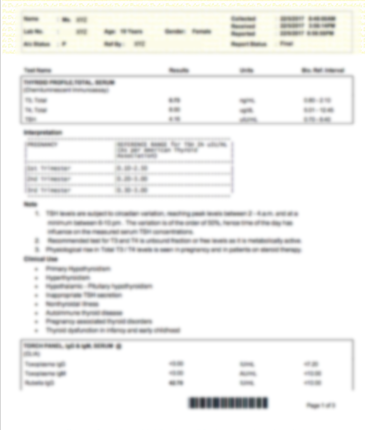Bicarbonate
- C1044
Rs 660
- Also Known As:
Bicarbonate (Total CO2) - Formal Name:
Total CO2 TCO2 Carbon Dioxide Content CO2 Content Bicarb HCO3- - Sample Instructions:
During a routine physical or as recommended by your healthcare practitioner if you are experiencing symptoms such as weakness, confusion, prolonged vomiting, or breathing problems that could indicate an electrolyte imbalance or an acid-base imbalance (commonly described as acidosis or alkalosis) - Test Preparation Needed?
A blood sample drawn from a vein in your arm - What Is Being Tested?
None - How Is It Used?
Bicarbonate is an electrolyte, a negatively charged ion that is used by the body to help maintain the body's acid-base (pH) balance. It also works with the other electrolytes (sodium, potassium, and chloride) to maintain electrical neutrality at the cellular level. This test measures the total amount of carbon dioxide (CO2) in the blood, which occurs mostly in the form of bicarbonate (HCO3-). The CO2 is mainly a by-product of various metabolic processes. Measuring bicarbonate as part of an electrolyte or metabolic panel may help diagnose an electrolyte imbalance or acidosis or alkalosis. Acidosis and alkalosis describe the abnormal conditions that result from an imbalance in the pH of the blood caused by an excess of acid or alkali (base). This imbalance is typically caused by some underlying condition or disease. The lungs and kidneys are the major organs involved in regulating blood pH through the removal of excess bicarbonate. The lungs flush acid out of the body by exhaling CO2. Raising and lowering the respiratory rate alters the amount of CO2 that is breathed out, and this can affect blood pH within minutes. The kidneys eliminate acids in the urine and they regulate the concentration of bicarbonate (HCO3-, a base) in blood. Acid-base changes due to increases or decreases in HCO3- concentration occur more slowly than changes in CO2, taking hours or days. Any disease or condition that affects the lungs, kidneys, metabolism, or breathing has the potential to cause acidosis or alkalosis. The bicarbonate test gives a healthcare practitioner a rough estimate of a patient's acid-base balance. This is usually sufficient, but measurements of gases dissolved in the blood (blood gases) may be done if more information is needed. Bicarbonate is typically measured along with sodium, potassium, and possibly chloride in an electrolyte panel as it is the balance of these molecules that gives the healthcare practitioner the most information. How is the sample colle - When Is It Ordered
The bicarbonate (or total CO2) test is usually ordered along with sodium, potassium, and chloride as part of an electrolyte panel. The electrolyte panel is used to help detect, evaluate, and monitor electrolyte imbalances and/or acid-base (pH) imbalances (acidosis or alkalosis). It may be ordered as part of a routine exam or to help evaluate a variety of chronic or acute illnesses. An electrolyte panel may be used to help monitor conditions, such as kidney disease, lung disorders, and high blood pressure (hypertension). When acidosis or alkalosis is identified, bicarbonate (as part of the electrolyte panel) and blood gases may be ordered to evaluate the severity of the pH imbalance. These tests help determine whether it is primarily respiratory (due to an imbalance between the amount of oxygen coming in and CO2 being released) or metabolic (due to increased or decreased amounts of bicarbonate in the blood). They also help monitor treatment until acid-base balance is restored. - What Does The Test Result Mean?
Bicarbonate testing may be ordered, usually as part of an electrolyte panel, a basic metabolic panel (BMP), or a comprehensive metabolic panel (CMP), when a person has a routine health checkup. This testing may be ordered when acidosis or alkalosis is suspected or when someone has an acute condition with symptoms that may include the following: Prolonged vomiting and/or diarrhea Weakness, fatigue Difficulty breathing (respiratory distress) Electrolytes may be ordered at regular intervals when a person has a disease or condition or is taking a medication that can cause an electrolyte imbalance. Electrolyte panels or basic metabolic panels are commonly used to monitor treatment of certain problems, including high blood pressure (hypertension), heart failure, and liver and kidney disease. - Is There Anything Else I Should Known?
When bicarbonate levels are higher or lower than normal, it suggests that the body is having trouble maintaining its acid-base balance, either by failing to remove carbon dioxide through the lungs or the kidneys or perhaps because of an electrolyte imbalance, particularly a deficiency of potassium. Both of these imbalances may be due to a wide range of conditions. Examples of causes of a low bicarbonate level include: Addison disease Chronic diarrhea Diabetic ketoacidosis Metabolic acidosis Respiratory alkalosis, which can be caused by hyperventilation Shock Kidney disease Ethylene glycol or methanol poisoning Salicylate (aspirin) overdose Examples of causes of a high bicarbonate level include: Severe, prolonged vomiting and/or diarrhea Lung diseases, including COPD Cushing syndrome Conn syndrome Metabolic alkalosis
Frequently Booked Test
Absolute Eosinophil Count
-
C1214
-
5-a-Dihydrotestosterone (5a DHT)
-
within 72 Hrs of Test Schdule
₹ 350.00
Absolute Eosinophil Count
-
C1214
-
5-a-Dihydrotestosterone (5a DHT)
-
within 72 Hrs of Test Schdule
₹ 350.00
Absolute Eosinophil Count
-
C1214
-
5-a-Dihydrotestosterone (5a DHT)
-
within 72 Hrs of Test Schdule
₹ 350.00
